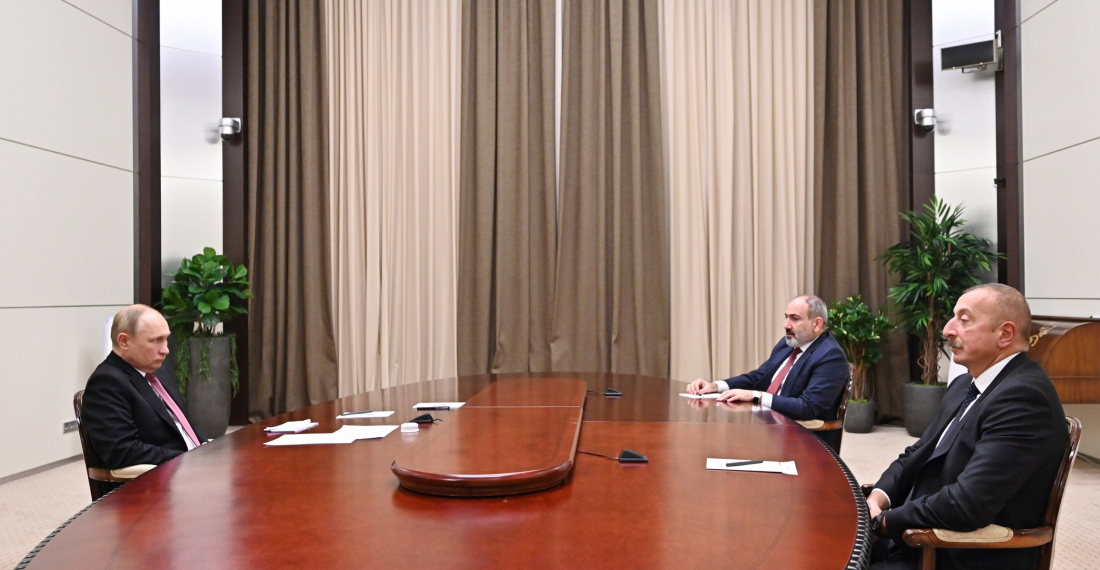The president of Russia, Vladimir Putin, hosted the prime minister of Armenia, Nikol Pashinyan, and the president of Azerbaijan, Ilham Aliyev, earlier today (26 November) for a trilateral meeting in the Russian Black Sea city of Sochi. The Russian president also held seperate bilateral meetings with his guests.
Speaking at the start of the talks Putin highlighted the importance of the meeting. He noted that while a lot had been done during the last year, including the creation of the tripartite commission at the level of deputy prime ministers, the return of refugees, and the implementation of “conditions for a future normal, peaceful life”, not all issues had been resolved. In particular, he noted the string of tragic incidents and border skirmishes which had taken lives on both sides. He went on to add that one of the main reason for their presence in Sochi today was “to avoid similar incidents in the future”. However, he also said that the goal of all their efforts should be the creation of “conditions for the revival of the region, so that people can feel safe there and can normally engage in economic activities”.
On his part, president Aliyev affirmed that the border incidents had not been serious incidents, but rather isolated cases that were non-systemic. He added that Azerbaijan had shown “maximum constructivism in eliminating the consequences of the war and in unblocking communications”, and that this was one of the most important next steps because “the points of the trilateral statement, which was adopted and signed last year, in November, are practically all fulfilled”. He also said that Azerbaijan was publicly offering the Armenian side the opportunity “to start work on a peace treaty in order to end the confrontation, to recognize the territorial integrity, sovereignty of each other and live in the future as neighbours and learn to live as neighbours anew".
Armenian prime minister Pashinyan said that he did not agree with Aliyev’s statement that all the points, except for the unblocking of communications, had already been implemented.
He re-iterated that “Armenia is ready to start the process of border delimitation and demarcation. The issue of unblocking all transport and economic infrastructures is also very important for us, we are sincerely interested in solving these issues. I hope that today we will discuss these discussions, all the issues”. He also noted that while he thought the settlement of the Nagorno-Karabakh conflict should take place under the auspices of the OSCE Minsk Group co-chairs, he did think that many issues could be discussed in bilateral and trilateral formats.
He concluded by saying that “the main purpose of today's meeting is not only to raise the issue of the existence or absence of some problems, but the main thing is that today we can come to concrete or as concrete decisions as possible in the region of stability in the South Caucasus”.
The three leaders released a statement at the end of the meeting, in which they reaffirmed their commitments to implementing the trilateral statements, and agreed to intensify their joint efforts to reach these aims.
They also announced that they would take steps to increase the level of stability and security on the Azerbaijani-Armenian border, including through “the creation of a bilateral commission on the delimitation of the state border between the Republic of Azerbaijan and the Republic of Armenia with its subsequent demarcation with the consultative assistance of the Russian Federation at the request of the parties”.
Finally, it was added that "from now on, the Russian Federation will continue to provide the necessary assistance to normalize relations between the Republic of Azerbaijan and the Republic of Armenia, to build an atmosphere of trust between the Azerbaijani and Armenian peoples, and to establish good-neighbourly relations in the region".



